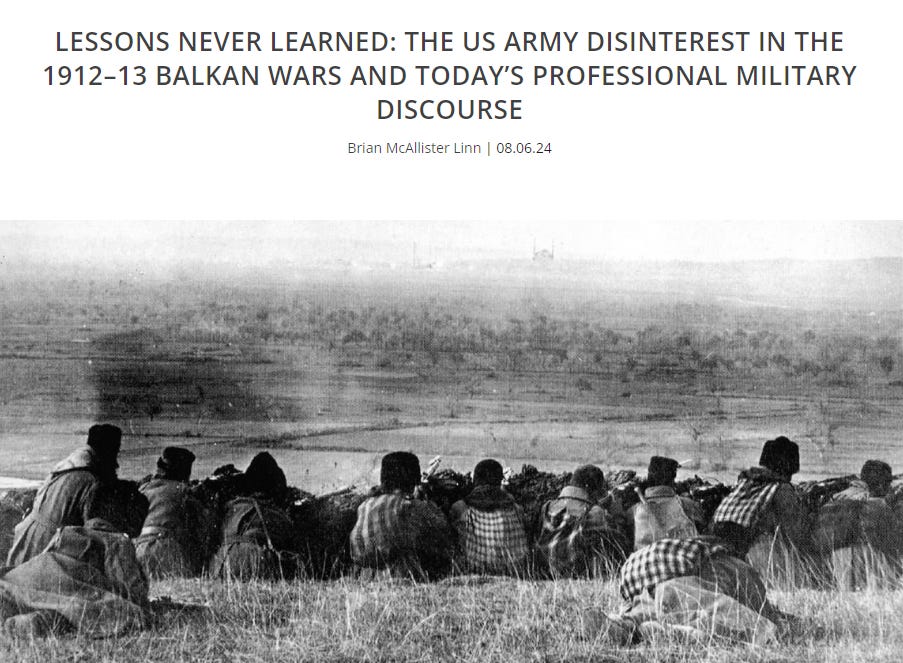Learning from Foreign Wars
How the Army's journals help--and could improve
** Applications for the Harding Fellowship are open through 10 September. Learn more here and apply! **
The Army’s journals help the Army learn lessons—but this lesson learning is uneven.
To better understand why, Professor Brian Linn, noted historian at Texas A&M, recently compared the coverage in the Army’s journals of the Russo-Japanese War (1904-1905) and the Balkan Wars (1912-1913) over at West Point’s Modern War Institute. The Army went “all in” on the Russo-Japanese War, sending observer teams that included notable leaders like John J. Pershing and publishing their observations as books—all while the Army’s journals published both American and foreign analysis. Conversely, the Army all but ignored the Balkan Wars. Despite involving more than 1,500,000 combatants, the Army sent only one observer and the Army’s journals only had a small amount of coverage.
His article is worth reading (click here!) but I’ve also excerpted a few choice sections below.
On the importance of learning from foreign wars:
The ongoing conflicts in Ukraine and the Middle East have generated an extensive commentary seeking both to define the characteristics of modern war and to identify lessons applicable for future conflicts. Reflecting today’s proliferation of information (and opinions), students of modern war can quickly exhaust themselves listening to podcasts and seminars, watching videos, and reading everything from blogs to official documents. Given the vast—and often contradictory—amount of current analysis, a study of how the pre–information age US Army’s professional journals assimilated and disseminated lessons from ongoing conflicts may assist those seeking a path through today’s flood of commentary. It also confirms the Harding Project’s recognition of the importance of both the quality and influence of the service’s professional journals.
On the danger of confirmation bias:
Third, many authors and editors viewed the Balkan Wars as an opportunity to confirm preexisting beliefs rather than to learn new lessons. This perfunctory treatment may reflect widespread intellectual exhaustion brought on by a decade of numerous organizational changes (the Root Reforms) and revisions to both branch-specific and Army-wide doctrine. It is not surprising that the branch schools, which sponsored their respective military journals, believed their primary responsibility was to teach bewildered readers the new methods, and not to expose them to still newer ones. Unfortunately, in their focus on equipment, drill, and inspirational tales of past glories they too often fell victim to the compartmentalization and narrow focus identified by J. P. Clark. Thus, the Infantry Journal, whose editorial board passed up no opportunity to bemoan America’s military unpreparedness, identified as the most important lesson of the Balkan Wars that the Bulgarians had mobilized an entire army and defeated the Turks in a fraction of the time the United States had taken to deploy a skeleton division on its borders. The Cavalry Journal, representing a branch on the defensive against charges of obsolescence and irrelevance, found in the Balkan Wars proof of the cavalry’s importance. This problem of confirmation rather than learning was not unique to the Americans. Miles noted his fellow observers from other countries, drawn from their respective general staffs, were so engrossed in strategy, maps, and the movement of divisions and armies, they remained indifferent to the realities of trench warfare, food, and soldiers’ morale that proved decisive in the war’s outcome.
Finally, he calls for a new journal.
The proposed new journal would serve as what J. P. Clark terms a “watering hole” where Army readers could find longer articles dealing with topics of broad, collective interest. These articles would be written by authors with sufficient research, analytical, and writing skills to discuss military issues that transcend headlines. This journal’s editors could offer a prize for the best essay on a topic of perennial Army concern such as conceptualizing future warfare, improving morale and leadership, winning the information battle both at home and abroad, recruitment and retention, or comparisons of US, allied, and potentially hostile forces. The winning essay and runners up might be published in a single issue. The journal would encourage contributions by all grades and tolerate both criticism and praise. And, in keeping with the new and welcome emphasis on critical thinking and clear and cogent writing, articles would provide officers (and potential authors) with templates for writing.
I think Military Review answers his call-to-arms, but would welcome your thoughts in the comments below.
Thanks Professor Linn for writing this piece!



It is a little bit of a frustrating article, because Military Review is exactly the publication he recommends, and it’s DePuy Writing Contest is the contest he recommends. It makes me a little concerned with the lack of awareness of Military Review among non-Army academia.
I wish he would have instead have made recommendations about the value of military observers. He highlights the lack of observers sent to the Balkan Wars, but he does not really diagnose why there were less there. I would assume that the US sent less observers to the Balkans due to its Pacific orientation in the early 1900s, that Russia and Japan were great powers, and that the two Balkan Wars were relatively short.
It would have been interesting to discuss the value of revitalizing the practice of observer missions and how they can feed official studies and professional writing. We largely have to rely on open source information, reporters, and a few intrepid academics for information on modern conflict, but those sources do not bring the same lens of analysis as professional military observers would.